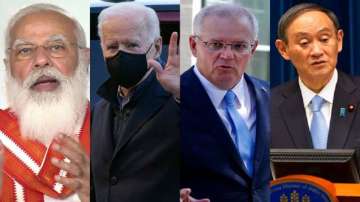The United States, Japan, India and Australia are likely to sign an agreement to take steps to build secure semiconductor chip supply chains when they meet in Washington for the Indo-Pacific Quad summit next week, according to a report Japans Nikkei newspaper.
The move is aimed at reducing the dependence for semiconductor chips on an increasingly assertive China.
Prime Minister Narendra Modi will be attending the first in-person Quad summit to be hosted by U.S. President Joe Biden in Washington.
The Nikkei report is based on a draft of the joint statement that is expected to be issued at the summit. The draft says that in order to create robust supply chains, the four countries will ascertain their semiconductor supply capacities and identify vulnerability.
The statement also says the use of advanced technologies should be based on the rule of respecting human rights, the newspaper said on its website. The chip shortage is worldwide and even Indian auto and smartphone manufacturing companies have been affected.
The U.S. Senate has already approved by an overwhelming majority the legislation to provide a staggering $190 billion package to beef up the country's ability to compete with Chinese technology.
The bill authorises the largest ever funding in American history for technology research, semiconductor development and manufacturing, as well as subsidies for robot makers and chipmakers. The computer chip shortage has hit automobile production in major US companies such as GM at a time when global demand is reviving.
ALSO READ | US President Biden to host in-person Quad Summit at White House on September 24, PM Modi to attend
U.S. Commerce Secretary Gina Raimondo has said the funding is on a scale that could enable the setting up of as many as seven to 10 new U.S. semiconductor plants.
US President Joe Biden is continuing with his predecessor Donald Trump's hard line as far as China is concerned. He has blacklisted over 50 Chinese companies because of their links to Beijing's "military-industrial complex." US companies and investors are barred from entering into any deals with these companies.
These companies are suspected to be stealing US technology and using it to strengthen China's military and fuel its belligerent foreign policy which has emerged as a worrying factor in Asia and the Indo-Pacific region.
Dozens of Chinese companies such as telecom giant Huawei, top chipmaker SMIC and drone manufacturer SZ DJI Technology were put on a trade blacklist by the Trump administration.
ALSO READ | PM Modi, President Joe Biden bilateral meet on Sept 24, confirms White House
Latest India News

